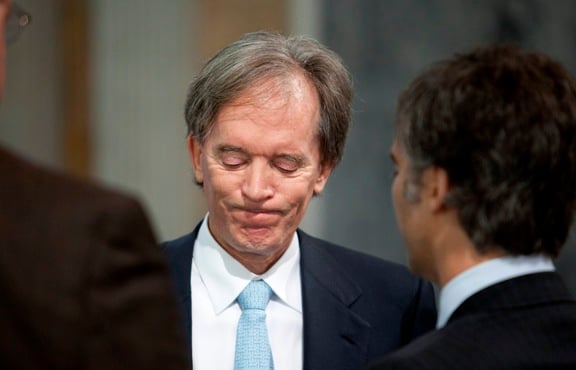Bill Gross is backing away from Pacific Investment Management Co.'s outlook for a “new normal” after lagging behind the majority of his peers during the biggest bond-market rally in nine years.
Bill Gross is backing away from Pacific Investment Management Co.'s outlook for a “new normal” after lagging behind the majority of his peers during the biggest bond-market rally in nine years.
The period of muted growth in developed economies, high unemployment and “relatively orderly delevering” that Mohamed El-Erian, who shares the title of chief investment officer with Gross, coined in the aftermath of the 2008 financial crisis appears to be morphing into a world of credit and zero-bound interest-rate risk, said Gross, the founder of Pimco and manager of the world's biggest bond fund.
“It's as if the earth now has two moons instead of one and both are growing in size like a cancerous tumor that may threaten the financial tides, oceans and economic life as we have known it for the past half century,” Gross wrote in a monthly investment outlook posted on the Newport Beach, Calif.-based company's website today. “Welcome to 2012.”
Most developed economies have not, in fact, de-levered since 2008 and credit remains resilient because of the multitude of monetary stimulus packages being made available through central banks in the U.S. and Europe, Gross wrote. This risks leading to unraveling of financial markets if policy makers are unable to foster growth and inflation accelerates, he said.
Hedging Bets
Until the outcome is clear, Pimco is advising investors to consider ways to hedge their bets, including U.S. Treasuries, long-term inflation-indexed U.S. debt, high-quality corporates, senior bank debt and municipal securities.
The recommendations mark a departure from Gross's call last year, when he advised buying higher-yielding emerging market debt as part of the “new normal” and cautioned investors to stay away from the U.S., noting that growth would be higher in developing economies, while excessive borrowing here, the U.K. and Japan would lead to inflation. To that end, Gross eliminated his holdings of Treasuries in February and had a net bet against the securities in the $244 billion Total Return Fund, missing the biggest rally in Treasuries since 2008. Gross issued a “Mea Culpa” to investors in October and boosted the debt to 23 percent of the portfolio by the end of November.
Pimco Total Return Fund had $5 billion in client redemptions last year, its first year of withdrawals in records going back to 1993, according to Morningstar Inc. Clients pulled $1.35 billion from the fund in December, according to the Chicago-based research firm.
Treasury Bull
Pimco Total Return in December 2009 became the biggest mutual fund in the history of the industry after beating most rivals and attracting a record $50 billion in deposits that year. In the five years through Dec. 30, the fund advanced at an annual rate of 8.1 percent, outperforming 97 percent of competitors.
“The bulk of sovereign bond holdings should be in the U.S.,” Gross wrote in today's investment outlook. “As long as Euroland credit implosion is possible investors should gravitate to the ‘cleanest dirty shirt' sovereigns with the least encumbered balance sheets. Focus on five- to nine-year Treasury maturities to guard against inflation which create opportunities to take advantage of roll-down capital gains.”
Treasuries returned 9.8 percent in 2011, while Gross's Total Return Fund gained 4.2 percent, underperforming about 70 percent of its rivals, according to data compiled by Bloomberg.
Bonds worldwide returned 5.9 percent last year, according to Bank of America Merrill Lynch's Global Broad Market Index. That was the biggest increase since the index gained 8.9 percent in 2002.
‘Great Risk'
“Investors must lower return expectations,” Gross wrote. “The financial markets and global economies are at great risk. Two to five percent for stocks, bonds and commodities are expected long-term returns for global financial markets that have been pushed to the zero bound, a world where substantial real price appreciation is getting close to mathematically improbable.”
Minutes released yesterday of the Federal Reserve's Dec. 13 policy meeting said policy makers for the first time will make public their own forecasts for the federal funds rate beginning at the Jan. 24-25 meeting. Fed officials will show investors their forecast for the benchmark interest rate in the fourth quarter of 2012 and the next few calendar years, the minutes said.
‘Cost of Money'
“I expect the January Fed meeting to mirror in some ways what we have first witnessed from the ECB,” Gross wrote. “It won't take the form of three-year financing by a central bank, but will give assurances via language that the cost of money will remain constant at 25 basis points for three years or more -- until inflation or unemployment reach specific target levels. If and when that doesn't work, then a specific QE3 may be announced, probably by mid-year.”
“The financial markets are slowly imploding -- delevering -- because there's too much paper and too little trust,” Gross wrote. “Goodbye ‘old normal,' standby to redefine ‘new normal' and welcome to 2012's ‘paranormal.'”
--Bloomberg News--







